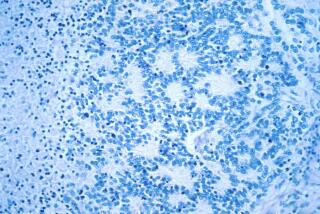Promise Seen in New Cancer Therapy
- Share via
WASHINGTON — Ten of the most desperate skin cancer patients have had their tumors stopped or nearly destroyed by a new treatment that involves replacing virtually their entire immune systems with specially targeted killer cells, researchers said Thursday.
Although the treatment failed completely in three patients, those who responded had few side effects and several were able to go back to work or school, said the National Cancer Institute’s Dr. Steven Rosenberg, who led the study.
“Here we are trying to take advantage of the body’s own natural defenses,” Rosenberg told a seminar sponsored by the American Medical Assn.
His team experimented on 13 advanced melanoma patients. Melanoma, which annually affects an estimated 50,000 people in this country, is easily treated if caught early but is deadly if not.
Some of the patients probably only had months to live, despite having had surgery, chemotherapy and treatment with the hormone interleukin to stimulate the immune system, Rosenberg said.
Rosenberg wanted to see if there was a way to use some of the body’s own immune system cells to destroy the cancer. “The body recognizes the cancer as foreign, but not foreign enough to reject it,” he said.
So they took out little pieces of each patient’s tumor and checked for lymphocytes--immune system cells--that actually were attacking the tumor cells. They grew these in the laboratory and looked to see which ones were the most active against the tumor.
They then used drugs to virtually destroy each patient’s own immune system. Often doctors do something similar to treat leukemia: destroying the bone marrow, where the immune cells are produced, and replacing it with bone marrow from a donor.
The NCI technique, described in today’s issue of the journal Science, was different.
The team replaced the destroyed immune systems with the cells that had been found to be most active against the tumor cells. All it took was a 20-minute intravenous infusion. These cells thrived in the patients, Rosenberg said.
“Not only do you get the large numbers, but they stay there,” Rosenberg said.
In one of the patients, 97% of the lymphocytes specifically targeted the cancer cells, and they can last as long as five months, he said.
One 16-year-old boy had a tumor that started on his knee and spread through his body, despite treatment.
“He had a volleyball-size tumor in his pelvis. He was on round-the-clock narcotics,” Rosenberg said. “I would guess his life expectancy was a couple of months. The patient, two years later, is completely disease-free.”
Rosenberg also was pleased to find that the patients’ immune systems seemed to have recovered fully from the treatment. Two patients contracted infections while undergoing the therapy, but they survived with treatment.
Rosenberg warned that the treatment is highly experimental and will not be available for years. “Some patients have not responded at all,” he said.
Nonetheless, he hopes it can be used against a range of cancers.






